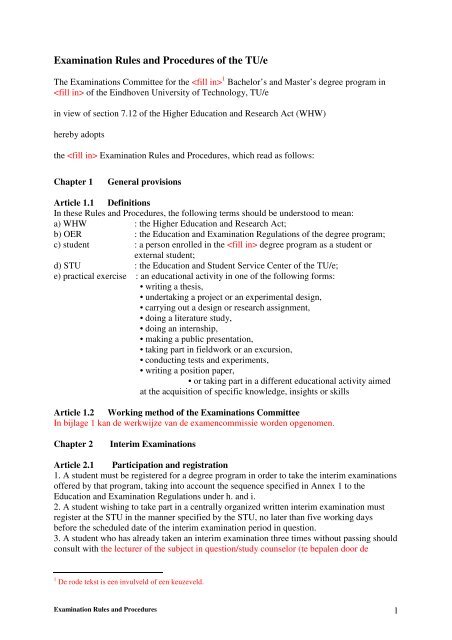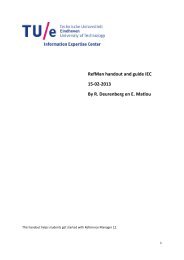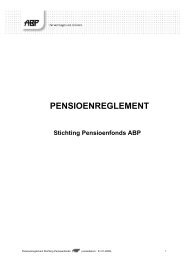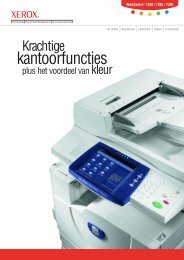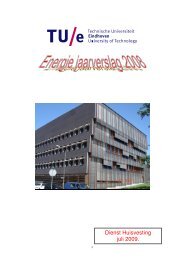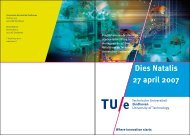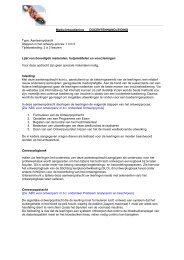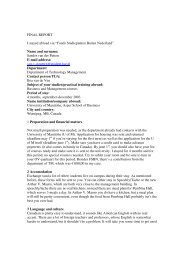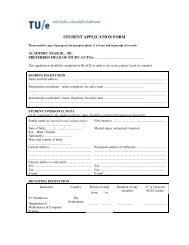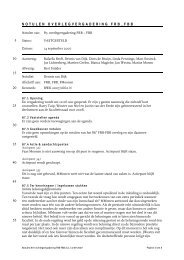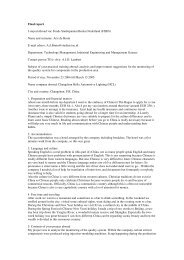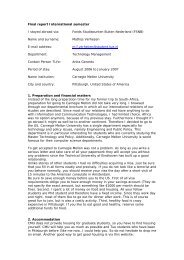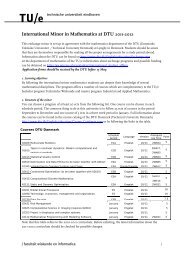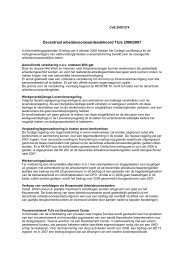Examination Rules and Procedures of the TU/e
Examination Rules and Procedures of the TU/e
Examination Rules and Procedures of the TU/e
You also want an ePaper? Increase the reach of your titles
YUMPU automatically turns print PDFs into web optimized ePapers that Google loves.
<strong>Examination</strong> <strong>Rules</strong> <strong>and</strong> <strong>Procedures</strong> <strong>of</strong> <strong>the</strong> <strong>TU</strong>/e<br />
The <strong>Examination</strong>s Committee for <strong>the</strong> 1 Bachelor’s <strong>and</strong> Master’s degree program in<br />
<strong>of</strong> <strong>the</strong> Eindhoven University <strong>of</strong> Technology, <strong>TU</strong>/e<br />
in view <strong>of</strong> section 7.12 <strong>of</strong> <strong>the</strong> Higher Education <strong>and</strong> Research Act (WHW)<br />
hereby adopts<br />
<strong>the</strong> <strong>Examination</strong> <strong>Rules</strong> <strong>and</strong> <strong>Procedures</strong>, which read as follows:<br />
Chapter 1 General provisions<br />
Article 1.1 Definitions<br />
In <strong>the</strong>se <strong>Rules</strong> <strong>and</strong> <strong>Procedures</strong>, <strong>the</strong> following terms should be understood to mean:<br />
a) WHW : <strong>the</strong> Higher Education <strong>and</strong> Research Act;<br />
b) OER : <strong>the</strong> Education <strong>and</strong> <strong>Examination</strong> Regulations <strong>of</strong> <strong>the</strong> degree program;<br />
c) student : a person enrolled in <strong>the</strong> degree program as a student or<br />
external student;<br />
d) S<strong>TU</strong> : <strong>the</strong> Education <strong>and</strong> Student Service Center <strong>of</strong> <strong>the</strong> <strong>TU</strong>/e;<br />
e) practical exercise : an educational activity in one <strong>of</strong> <strong>the</strong> following forms:<br />
• writing a <strong>the</strong>sis,<br />
• undertaking a project or an experimental design,<br />
• carrying out a design or research assignment,<br />
• doing a literature study,<br />
• doing an internship,<br />
• making a public presentation,<br />
• taking part in fieldwork or an excursion,<br />
• conducting tests <strong>and</strong> experiments,<br />
• writing a position paper,<br />
• or taking part in a different educational activity aimed<br />
at <strong>the</strong> acquisition <strong>of</strong> specific knowledge, insights or skills<br />
Article 1.2 Working method <strong>of</strong> <strong>the</strong> <strong>Examination</strong>s Committee<br />
In bijlage 1 kan de werkwijze van de examencommissie worden opgenomen.<br />
Chapter 2 Interim <strong>Examination</strong>s<br />
Article 2.1 Participation <strong>and</strong> registration<br />
1. A student must be registered for a degree program in order to take <strong>the</strong> interim examinations<br />
<strong>of</strong>fered by that program, taking into account <strong>the</strong> sequence specified in Annex 1 to <strong>the</strong><br />
Education <strong>and</strong> <strong>Examination</strong> Regulations under h. <strong>and</strong> i.<br />
2. A student wishing to take part in a centrally organized written interim examination must<br />
register at <strong>the</strong> S<strong>TU</strong> in <strong>the</strong> manner specified by <strong>the</strong> S<strong>TU</strong>, no later than five working days<br />
before <strong>the</strong> scheduled date <strong>of</strong> <strong>the</strong> interim examination period in question.<br />
3. A student who has already taken an interim examination three times without passing should<br />
consult with <strong>the</strong> lecturer <strong>of</strong> <strong>the</strong> subject in question/study counselor (te bepalen door de<br />
1 De rode tekst is een invulveld <strong>of</strong> een keuzeveld.<br />
<strong>Examination</strong> <strong>Rules</strong> <strong>and</strong> <strong>Procedures</strong> 1
opleiding) before registering for <strong>the</strong> interim examination in question again to discuss how <strong>the</strong><br />
problem is to be addressed on <strong>the</strong> basis <strong>of</strong> a study plan drawn up by <strong>the</strong> student.<br />
4. With reference to paragraph three, students who register for an interim examination but fail<br />
to appear will be considered to have failed <strong>the</strong> examination.<br />
5. The work <strong>of</strong> students who take part in an interim examination without having registered for<br />
it will not be assessed.<br />
6. The <strong>Examination</strong>s Committee will determine whe<strong>the</strong>r a student meets <strong>the</strong> conditions for<br />
admission to an interim examination see <strong>the</strong> OER for <strong>the</strong> Bachelor’s <strong>and</strong> Master’s program<br />
concerned in Annex 1, under e, h <strong>and</strong> i.).<br />
7. In exceptional circumstances, <strong>the</strong> <strong>Examination</strong>s Committee can permit a student to take an<br />
alternative interim examination to <strong>the</strong> centrally organized examination.<br />
8. Where it is considered necessary for organizational or educational reasons, registering for<br />
study components, such as practical exercises <strong>and</strong> lectures, must occur according to <strong>the</strong> rules<br />
published in <strong>the</strong> subject pages on owinfo.nl. Students who do not comply with <strong>the</strong>se rules<br />
when registering for a study component, or who register after <strong>the</strong> date specified, may not<br />
participate in <strong>the</strong> component in <strong>the</strong> period concerned. The <strong>Examination</strong>s Committee may<br />
make exceptions in such cases.<br />
Article 2.2 Withdrawal<br />
1. After registering for an interim examination, a student may withdraw no later than five<br />
working days before <strong>the</strong> examination is to take place, by notifying S<strong>TU</strong> in <strong>the</strong> manner<br />
specified by S<strong>TU</strong>.<br />
2. With reference to paragraph three <strong>of</strong> article 2.1, students who withdraw within five working<br />
days before <strong>the</strong> interim examination will be considered to have failed <strong>the</strong> examination.<br />
3. In exceptional cases, <strong>the</strong> <strong>Examination</strong>s Committee may deviate from <strong>the</strong> provisions in<br />
paragraph two <strong>of</strong> this article.<br />
4. The <strong>Examination</strong>s Committee can ask <strong>the</strong> advice <strong>of</strong> <strong>the</strong> student counselor <strong>of</strong> <strong>the</strong> degree<br />
program in question or <strong>of</strong> <strong>the</strong> S<strong>TU</strong> student advisors.<br />
Article 2.3 Questions <strong>and</strong> assignments<br />
1. The questions <strong>and</strong> assignments <strong>of</strong> <strong>the</strong> interim examination will be restricted to <strong>the</strong> content<br />
<strong>of</strong> <strong>the</strong> course material. As a rule, <strong>the</strong> course material for <strong>the</strong> interim examination will be<br />
announced at <strong>the</strong> start <strong>of</strong> <strong>the</strong> course. The exact content <strong>of</strong> <strong>the</strong> material for <strong>the</strong> interim<br />
examination <strong>and</strong> what aids <strong>the</strong> student may use during <strong>the</strong> examination will be made known<br />
no later than one month before <strong>the</strong> examination is to take place.<br />
2. The questions <strong>and</strong> assignments <strong>of</strong> <strong>the</strong> interim examination will be restricted to <strong>the</strong> learning<br />
objectives announced in advance.<br />
3. The questions <strong>and</strong> assignments will be clear <strong>and</strong> unequivocal, <strong>and</strong> formulated so that <strong>the</strong><br />
student is able to ascertain how extensive or detailed <strong>the</strong> answer should be.<br />
4. The student may keep <strong>the</strong> questions <strong>and</strong> assignments at <strong>the</strong> end <strong>of</strong> <strong>the</strong> interim examination,<br />
unless <strong>the</strong> examiner objects to this or <strong>the</strong> nature <strong>of</strong> <strong>the</strong> questions <strong>and</strong> assignments precludes<br />
this.<br />
Chapter 3 Procedure during interim examinations<br />
Article 3.1 Preserving order during interim examinations (see Annex 2)<br />
1. For each interim examination <strong>the</strong> <strong>Examination</strong>s Committee will appoint at least one<br />
examiner <strong>and</strong>, if necessary, invigilators.<br />
<strong>Examination</strong> <strong>Rules</strong> <strong>and</strong> <strong>Procedures</strong> 2
2. Students are obliged, before or during <strong>the</strong> interim examination, <strong>and</strong> at <strong>the</strong> request <strong>of</strong> <strong>the</strong><br />
examiners or <strong>the</strong> invigilators, to identify <strong>the</strong>mselves by showing <strong>the</strong>ir student card <strong>and</strong> valid<br />
pro<strong>of</strong> <strong>of</strong> enrollment for <strong>the</strong> current academic year.<br />
3. Before, during <strong>and</strong> immediately after an interim examination, students are obliged to follow<br />
<strong>the</strong> instructions <strong>of</strong> <strong>the</strong> examiners or invigilators. These instructions include <strong>the</strong> directions<br />
referred to in Annex 2 <strong>of</strong> <strong>the</strong>se <strong>Examination</strong> <strong>Rules</strong> <strong>and</strong> <strong>Procedures</strong>.<br />
4. Any student who fails to comply with <strong>the</strong> provisions in paragraphs two <strong>and</strong> three <strong>of</strong> this<br />
article may be immediately excluded by <strong>the</strong> examiner from fur<strong>the</strong>r participation in <strong>the</strong> interim<br />
examination.<br />
5. Exclusion as described in paragraph 4 means that <strong>the</strong> interim examination results <strong>of</strong> <strong>the</strong><br />
student in question will not be assessed <strong>and</strong> that <strong>the</strong>y will be considered to have failed <strong>the</strong><br />
examination, with regard to implementation <strong>of</strong> paragraph three <strong>of</strong> article 2.1.<br />
6. For <strong>the</strong> implementation <strong>of</strong> this current article, interim examinations also include any<br />
practical exercises that are part <strong>of</strong> <strong>the</strong> degree program.<br />
Article 3.2 Regulations regarding fraud<br />
1. Fraud comprises in any case any action by a student, or failure to act by a student, which<br />
makes it partially or completely impossible for <strong>the</strong> examiner to form an accurate opinion <strong>of</strong><br />
his/her knowledge, underst<strong>and</strong>ing <strong>and</strong> skills.<br />
2. Fraud includes: - submitting work under his/her own name that has been done by o<strong>the</strong>rs or<br />
copied from o<strong>the</strong>rs wholly or partially: this includes copying word-for-word or paraphrasing<br />
<strong>the</strong> work <strong>of</strong> o<strong>the</strong>rs without indicating that <strong>the</strong> words or underlying ideas belong to someone<br />
else; - actively <strong>of</strong>fering his/her own work to o<strong>the</strong>rs, who might <strong>the</strong>n submit it as <strong>the</strong>ir own<br />
work.<br />
3. If an examiner or invigilator should discover or suspect fraud in relation to <strong>the</strong> interim<br />
examination, ei<strong>the</strong>r before, during or immediately after <strong>the</strong> interim examination, <strong>the</strong> examiner<br />
will record this in writing as soon as possible. If requested, <strong>the</strong> student in question should<br />
present any evidence required. Refusal to do so will be mentioned in <strong>the</strong> report.<br />
4. The student in question will be given <strong>the</strong> opportunity to add written comments to <strong>the</strong><br />
examiner’s report.<br />
5. The report will be sent to <strong>the</strong> <strong>Examination</strong>s Committee as soon as possible, if applicable,<br />
toge<strong>the</strong>r with <strong>the</strong> student’s written comments.<br />
6. The <strong>Examination</strong>s Committee will take <strong>the</strong> measures it deems appropriate, taking into<br />
account <strong>the</strong> provisions <strong>of</strong> subsection 4 <strong>of</strong> section 7.12 <strong>of</strong> <strong>the</strong> WHW.<br />
7. Before taking a decision based on <strong>the</strong> previous paragraph, <strong>the</strong> <strong>Examination</strong>s Committee<br />
will give <strong>the</strong> student in question an opportunity to explain his/her actions.<br />
8. For <strong>the</strong> implementation <strong>of</strong> this current article, interim examinations also include practical<br />
exercises that are part <strong>of</strong> <strong>the</strong> degree program.<br />
Chapter 4 Assessment <strong>of</strong> interim examinations <strong>and</strong> practical exercises<br />
Article 4.1 Assessment<br />
1. Assessment <strong>of</strong> interim examinations <strong>and</strong> practical exercises is carried out by an examiner or<br />
examiners.<br />
2. The results <strong>of</strong> interim examinations <strong>and</strong> practical exercises will be determined for each<br />
individual student, <strong>and</strong> may be divided into a number <strong>of</strong> components.<br />
3. The assessment <strong>of</strong> an interim examination, as well as <strong>the</strong> investigation mentioned in article<br />
5.1, paragraph 2, <strong>of</strong> <strong>the</strong>se <strong>Examination</strong> <strong>Rules</strong> <strong>and</strong> <strong>Procedures</strong>, will be expressed in whole<br />
numbers on a scale <strong>of</strong> 0 to 10. [eventueel beoordeling toetsen (voorheen: deeltentamens) op te<br />
nemen (dat kan op tienden)] The assessment <strong>of</strong> practical exercises is expressed in accordance<br />
<strong>Examination</strong> <strong>Rules</strong> <strong>and</strong> <strong>Procedures</strong> 3
with <strong>the</strong> provisions in paragraph 3 or in half numbers, or <strong>the</strong> first sentence <strong>of</strong> this paragraph<br />
(wanneer beoordeling van toetsen wordt opgenomen) or in half numbers, using <strong>the</strong><br />
designations Failed (FL), Sufficiënt (PA) or Done (DN)<br />
4. An interim examination is passed if <strong>the</strong> grade is 6 or higher, or with an assessment <strong>of</strong> PA or<br />
DN. A practical exercise is passed if <strong>the</strong> grade is 5.5 or higher, or with an assessment <strong>of</strong> PA or<br />
DN.<br />
5. If a student registers for an interim examination but fails to appear, he/she will be<br />
considered to have failed <strong>the</strong> examination, under <strong>the</strong> provisions <strong>of</strong> paragraph three <strong>of</strong> article<br />
2.1, <strong>and</strong> <strong>the</strong> examination result will be marked NP (No show).<br />
6. If a student has committed fraud, as specified in article 3.2 <strong>of</strong> <strong>the</strong>se <strong>Rules</strong> <strong>and</strong> <strong>Procedures</strong>,<br />
<strong>the</strong> examination result, in accordance with article 2.1, paragraph 3, will be considered as<br />
Failed (FL).<br />
7. The assessment st<strong>and</strong>ards will be announced at <strong>the</strong> latest immediately before <strong>the</strong> start <strong>of</strong> <strong>the</strong><br />
interim examination.<br />
8. The method <strong>of</strong> assessment should enable <strong>the</strong> student to ascertain how <strong>the</strong> results <strong>of</strong> <strong>the</strong><br />
interim examination were determined.<br />
Chapter 5 Final examinations<br />
Article 5.1 Registration<br />
1. Students should register for a final examination at <strong>the</strong> S<strong>TU</strong> in <strong>the</strong> manner specified by <strong>the</strong><br />
S<strong>TU</strong> no later than 20 days before <strong>the</strong> date <strong>of</strong> <strong>the</strong> examination.<br />
2. The <strong>Examination</strong>s Committee will inform <strong>the</strong> students in good time when it plans to<br />
conduct an investigation, as provided in section 7.10, subsection 2 <strong>of</strong> <strong>the</strong> WHW.<br />
Article 5.2 Assessment <strong>and</strong> result<br />
1. If a student has taken an interim examination more than once, <strong>the</strong> <strong>Examination</strong>s Committee<br />
will take into account <strong>the</strong> highest grade obtained in determining <strong>the</strong> result <strong>of</strong> <strong>the</strong> final<br />
examination.<br />
2. The result <strong>of</strong> <strong>the</strong> final examination will be ‘passed’ or ‘failed’.<br />
3. A student is considered to have passed <strong>the</strong> final examination if he/she has passed <strong>the</strong><br />
corresponding interim examinations <strong>and</strong> practical exercises, taking into account <strong>the</strong><br />
compensation arrangements specified in article 5.3 <strong>and</strong> any exemptions that may have been<br />
granted to <strong>the</strong> student on <strong>the</strong> basis <strong>of</strong> article 2.7, paragraph 6 <strong>of</strong> <strong>the</strong> OER for <strong>the</strong> degree<br />
program, or if <strong>the</strong> investigation carried out by <strong>the</strong> <strong>Examination</strong>s Committee, as specified in<br />
article 5.1, paragraph 2, resulted in a grade <strong>of</strong> 6 or higher.<br />
Article 5.3 Compensation <strong>and</strong> bonus arrangements<br />
The compensation arrangements for <strong>the</strong> final examination are as follows:<br />
The bonus arrangements for ………………….. are as follows:<br />
(fill in)<br />
OF<br />
Indien niet van toepassing de volgende tekst opnemen:<br />
This program has no compensation or bonus arrangements<br />
Article 5.4 Certificate <strong>and</strong> supplement<br />
1. The certificate will be awarded in public unless, in exceptional cases, <strong>the</strong> <strong>Examination</strong>s<br />
Committee decides o<strong>the</strong>rwise.<br />
2. The certificate will contain <strong>the</strong> information specified in section 7.11, subsection 2, <strong>of</strong> <strong>the</strong><br />
WHW.<br />
<strong>Examination</strong> <strong>Rules</strong> <strong>and</strong> <strong>Procedures</strong> 4
3. When <strong>the</strong> certificate is awarded, <strong>the</strong> student will also receive a supplement.<br />
4. The supplement will contain <strong>the</strong> information specified in section 7.11, subsection 3, <strong>of</strong> <strong>the</strong><br />
WHW, as well as <strong>the</strong> grades received for parts <strong>of</strong> <strong>the</strong> examination <strong>and</strong>, if required, for o<strong>the</strong>r<br />
study components that are not part <strong>of</strong> <strong>the</strong> examination, if <strong>the</strong> students in question have passed<br />
<strong>the</strong> interim examinations for those study components before <strong>the</strong> <strong>Examination</strong>s Committee<br />
determines <strong>the</strong> final examination result.<br />
Article 5.5 Special qualifications for <strong>the</strong> propaedeutic year<br />
Nader in te vullen door opleiding indien deze bijzondere kwalificaties worden gebruikt.<br />
OF<br />
Indien niet van toepassing de volgende tekst opnemen:<br />
This program has no special qualifications relating to <strong>the</strong> certificate for <strong>the</strong> propaedeutic year.<br />
Article 5.6 Special qualification for Bachelor’s programs<br />
1. The <strong>Examination</strong>s Committee may award <strong>the</strong> classification “cum laude” if <strong>the</strong> student<br />
achieves an average grade <strong>of</strong> 8 or higher for all <strong>the</strong> study components (including minors) that<br />
are part <strong>of</strong> <strong>the</strong> program. In addition, none <strong>of</strong> <strong>the</strong> study components may have a grade lower<br />
than a 6.<br />
2. Only individual assessments are included in <strong>the</strong> calculation <strong>of</strong> <strong>the</strong> average grade. Group<br />
assessments are not taken into account.<br />
3. If <strong>the</strong> Bachelor’s program is concluded with a graduation project, <strong>the</strong> <strong>Examination</strong>s<br />
Committee may impose supplementary requirements regarding <strong>the</strong> result <strong>of</strong> <strong>the</strong> project.<br />
Article 5.7 Special qualification for Master’s programs<br />
The <strong>Examination</strong>s Committee may award <strong>the</strong> classification “cum laude” if <strong>the</strong> student<br />
achieves an average grade <strong>of</strong> 8 or higher for all <strong>the</strong> study components, with <strong>the</strong> exception <strong>of</strong><br />
<strong>the</strong> graduation project, which must have a grade <strong>of</strong> 9 or higher. In addition, none <strong>of</strong> <strong>the</strong> study<br />
components may have a grade lower than a 6.<br />
Chapter 6 Final provisions<br />
Article 6.1 Security<br />
During <strong>the</strong> processing <strong>of</strong> written or o<strong>the</strong>r types <strong>of</strong> interim examinations, <strong>the</strong> <strong>Examination</strong>s<br />
Committee will ensure proper protection against loss, <strong>the</strong>ft or wrongful acts.<br />
Article 6.2 Appeals<br />
No later than four weeks after <strong>the</strong> decision has been made known to <strong>the</strong>m, interested parties<br />
may lodge an appeal against a decision <strong>of</strong> <strong>the</strong> <strong>Examination</strong>s Committee or <strong>the</strong> examiners,<br />
based on <strong>the</strong>se <strong>Examination</strong> <strong>Rules</strong> <strong>and</strong> <strong>Procedures</strong>, with <strong>the</strong> <strong>Examination</strong> Appeals Board<br />
(CBE) as referred to in section 7.60 <strong>of</strong> <strong>the</strong> WHW.<br />
Article 6.3 Amendments<br />
Amendments to <strong>the</strong>se <strong>Examination</strong> <strong>Rules</strong> <strong>and</strong> <strong>Procedures</strong> may only come into force in <strong>the</strong><br />
current academic year if this does not, within reason, have a negative effect on <strong>the</strong> interests <strong>of</strong><br />
<strong>the</strong> students.<br />
Article 6.4 Transitional arrangement/provision<br />
The degree classifications specified in articles 5.6 <strong>and</strong> 5.7 apply to students who start <strong>the</strong> first<br />
year <strong>of</strong> <strong>the</strong> Bachelor’s program or <strong>the</strong> first year <strong>of</strong> <strong>the</strong> Master’s program on September 1,<br />
<strong>Examination</strong> <strong>Rules</strong> <strong>and</strong> <strong>Procedures</strong> 5
2007. For students already enrolled in previous years, <strong>the</strong> <strong>Rules</strong> <strong>and</strong> <strong>Procedures</strong> <strong>of</strong> <strong>the</strong> year in<br />
which <strong>the</strong>y started <strong>the</strong> program are applicable.<br />
EN<br />
Eventuele <strong>and</strong>ere overgangsbepalingen opnemen.<br />
Article 6.5 Effective date<br />
These <strong>Examination</strong> <strong>Rules</strong> <strong>and</strong> <strong>Procedures</strong> replace <strong>the</strong> <strong>Rules</strong> <strong>and</strong> <strong>Procedures</strong> <strong>of</strong> ………. <strong>and</strong><br />
come into effect September 1, 2007.<br />
Adopted by <strong>the</strong> ……………….. <strong>Examination</strong>s Committee on ………………..<br />
<strong>Examination</strong> <strong>Rules</strong> <strong>and</strong> <strong>Procedures</strong> 6
Annex 1 Working method <strong>of</strong> <strong>the</strong> <strong>Examination</strong>s Committee<br />
Mogelijkheid tot het opnemen van een huishoudelijk reglement van de Examencommissie.<br />
<strong>Examination</strong> <strong>Rules</strong> <strong>and</strong> <strong>Procedures</strong> 7
Annex 2 to article 3.1, paragraph 3, <strong>of</strong> <strong>the</strong> <strong>Examination</strong> <strong>Rules</strong> <strong>and</strong> <strong>Procedures</strong> for …….<br />
<strong>of</strong> ……… (date)<br />
Instructions for written interim examinations<br />
1. Students may be admitted to <strong>the</strong> examination up to 15 minutes after <strong>the</strong> start. They<br />
will not be allowed any extra time.<br />
2. Students may not leave <strong>the</strong> examination room earlier than 15 minutes after <strong>the</strong> start <strong>of</strong><br />
<strong>the</strong> examination.<br />
3. At <strong>the</strong> start <strong>of</strong> a written interim examination, students must fill in <strong>the</strong>ir ID number,<br />
program <strong>and</strong> full name <strong>and</strong> address on <strong>the</strong> attendance card provided <strong>and</strong> lay <strong>the</strong> card<br />
on <strong>the</strong> table so that <strong>the</strong> examiner or invigilator can see it clearly. In exceptional cases,<br />
<strong>the</strong> examiner may accept an alternative <strong>of</strong>ficial means <strong>of</strong> identification.<br />
4. Students must fill in <strong>the</strong> above information at <strong>the</strong> top <strong>of</strong> every sheet <strong>of</strong> paper to be<br />
h<strong>and</strong>ed in, clearly <strong>and</strong> completely, in capital letters, <strong>and</strong> with all initials. The sheets<br />
should be numbered in sequence.<br />
5. The <strong>TU</strong>/e will provide all <strong>the</strong> necessary paper. Students must bring <strong>the</strong>ir own writing<br />
<strong>and</strong> drawing materials. Rulers, compasses <strong>and</strong> set squares with angles <strong>of</strong> 30 <strong>and</strong> 45<br />
degrees are allowed for drawings.<br />
6. Students are not permitted to use papers, books, calculators, etc. o<strong>the</strong>r than those<br />
issued by <strong>the</strong> examiner, unless explicitly stated o<strong>the</strong>rwise on <strong>the</strong> interim examination<br />
form.<br />
7. Students are not permitted to use a mobile telephone or o<strong>the</strong>r electronic equipment<br />
during <strong>the</strong> examination, unless explicitly stated o<strong>the</strong>rwise by or on behalf <strong>of</strong> <strong>the</strong><br />
<strong>Examination</strong>s Committee.<br />
8. At <strong>the</strong> end <strong>of</strong> <strong>the</strong> examination, students may not leave <strong>the</strong>ir seats or talk to each o<strong>the</strong>r<br />
until all <strong>the</strong> written work has been collected by <strong>the</strong> invigilators.<br />
9. Students must h<strong>and</strong> in all <strong>the</strong>ir written work to <strong>the</strong> invigilators personally.<br />
<strong>Examination</strong> <strong>Rules</strong> <strong>and</strong> <strong>Procedures</strong> 8
Annex 3 to article 5.2, paragraph 4, <strong>of</strong> <strong>the</strong> <strong>Examination</strong> <strong>Rules</strong> <strong>and</strong> <strong>Procedures</strong> for …….<br />
<strong>of</strong> ……… (date)<br />
Mogelijkheid tot het opnemen van een Afstudeerregeling<br />
<strong>Examination</strong> <strong>Rules</strong> <strong>and</strong> <strong>Procedures</strong> 9
Explanatory notes to <strong>the</strong> <strong>Examination</strong> <strong>Rules</strong> <strong>and</strong> <strong>Procedures</strong> <strong>of</strong> <strong>the</strong> program<br />
General<br />
Under section 7.12, subsection 4, <strong>of</strong> <strong>the</strong> Higher Education <strong>and</strong> Research Act (WHW), <strong>the</strong><br />
<strong>Examination</strong>s Committee must draw up rules for <strong>the</strong> proper procedure to be followed during<br />
interim examinations <strong>and</strong> relating to any measures to be taken to safeguard that. In addition,<br />
under <strong>the</strong> same section, <strong>the</strong> <strong>Examination</strong>s Committee may provide guidelines <strong>and</strong> instructions<br />
to examiners regarding <strong>the</strong> assessment <strong>of</strong> persons taking interim examinations <strong>and</strong><br />
determining <strong>the</strong> results <strong>of</strong> interim examinations. These <strong>Examination</strong> <strong>Rules</strong> <strong>and</strong> <strong>Procedures</strong><br />
serve to implement this legal assignment <strong>and</strong> authority.<br />
In drawing up <strong>the</strong>se <strong>Examination</strong> <strong>Rules</strong> <strong>and</strong> <strong>Procedures</strong>, a direct link was made with <strong>the</strong><br />
Education <strong>and</strong> <strong>Examination</strong> Regulations adopted for <strong>the</strong> degree program by <strong>the</strong> Departmental<br />
Board (OER), which regulate a large number <strong>of</strong> issues on <strong>the</strong> basis <strong>of</strong> <strong>the</strong> Departmental<br />
Board’s legal authority. These <strong>Examination</strong> <strong>Rules</strong> <strong>and</strong> <strong>Procedures</strong> should <strong>the</strong>refore be read in<br />
conjunction with <strong>the</strong> OER for this degree program <strong>and</strong> – where admission to <strong>the</strong> program is<br />
concerned – <strong>the</strong> admission regulations for Master’s degree programs.<br />
Article 1.1<br />
The definitions in <strong>the</strong>se <strong>Examination</strong> <strong>Rules</strong> <strong>and</strong> <strong>Procedures</strong> have been limited to those<br />
concepts that were necessary for drawing up <strong>the</strong> <strong>Rules</strong> <strong>and</strong> <strong>Procedures</strong>. This does not affect<br />
<strong>the</strong> fact that clarity should be provided about <strong>the</strong> exact meaning <strong>of</strong> <strong>the</strong> various – sometimes<br />
legally-defined – concepts used in <strong>the</strong>se Regulations. A glossary has been added for this<br />
purpose, to prevent confusion about <strong>the</strong> meaning <strong>of</strong> <strong>the</strong> concepts.<br />
Article 1.2<br />
The work <strong>of</strong> <strong>the</strong> <strong>Examination</strong>s Committee may include, for example, appointing committees<br />
from among its own members to look after daily activities, etc.<br />
Article 2.1<br />
The first paragraph <strong>of</strong> this article specifies that a student may only legally take part in an<br />
interim examination if he/she is enrolled in <strong>the</strong> degree program. In addition, <strong>the</strong> rules included<br />
under e, h. <strong>and</strong> i. <strong>of</strong> <strong>the</strong> Annex to <strong>the</strong> Education <strong>and</strong> <strong>Examination</strong> Regulations apply. These<br />
refer to <strong>the</strong> sequence <strong>of</strong> interim examinations <strong>and</strong> <strong>the</strong> obligation to participate in certain<br />
practical exercises before an interim examination can be taken.<br />
The second paragraph determines that a student wishing to take part in a centrally organized,<br />
written interim examination must register at <strong>the</strong> S<strong>TU</strong> no later than five days before <strong>the</strong> interim<br />
examination period in question. Registration should take place in <strong>the</strong> manner determined by<br />
<strong>the</strong> S<strong>TU</strong>, i.e. through www.owinfo.tue.nl.<br />
The Executive Board <strong>of</strong> <strong>the</strong> <strong>TU</strong>/e considers it important that students prepare thoroughly for<br />
interim examinations. A student who has already taken an interim examination three times<br />
without passing should consult with <strong>the</strong> lecturer <strong>of</strong> <strong>the</strong> subject in question/study counselor<br />
(doorstrepen wat niet van toepassing is) before registering for <strong>the</strong> interim examination again<br />
to discuss how <strong>the</strong> problem is to be addressed on <strong>the</strong> basis <strong>of</strong> a study plan drawn up by <strong>the</strong><br />
student. The purpose <strong>of</strong> this compulsory student counseling is to discuss <strong>the</strong> student’s<br />
approach to his/her study <strong>and</strong> how this might lead to serious study delays. The lecturer <strong>of</strong> <strong>the</strong><br />
subject in question/study counselor must ensure that agreement is reached on <strong>the</strong> student’s<br />
<strong>Examination</strong> <strong>Rules</strong> <strong>and</strong> <strong>Procedures</strong> 10
approach on <strong>the</strong> basis <strong>of</strong> <strong>the</strong> student’s study plan <strong>and</strong> will provide any assistance necessary.<br />
This is specified in <strong>the</strong> third paragraph. A student may not register for an interim examination<br />
if <strong>the</strong>y have already failed it three times. This means that a student who has already had two<br />
fails <strong>and</strong> one satisfactory grade may register to do <strong>the</strong> interim examination again to try <strong>and</strong><br />
improve <strong>the</strong> grade. In this case, too, a student who has three fails <strong>and</strong> one or more satisfactory<br />
grades should contact <strong>the</strong> lecturer <strong>of</strong> <strong>the</strong> subject in question/study counselor.<br />
To encourage students to prepare thoroughly for interim examinations, <strong>the</strong> fourth paragraph <strong>of</strong><br />
this article specifies that a student who registers for an interim examination, <strong>and</strong> <strong>the</strong>n fails to<br />
appear or leaves early without h<strong>and</strong>ing in <strong>the</strong> work, will be considered as having failed <strong>the</strong><br />
examination. In this way, <strong>the</strong> <strong>Examination</strong>s Committee discourages students from registering<br />
for interim examinations too easily. In such cases, <strong>the</strong> student is considered as having taken<br />
part in <strong>the</strong> interim examination, as specified in paragraph 3.<br />
The fifth paragraph <strong>of</strong> this article explains to students that, failure to register for a centrally<br />
organized written interim examination according to <strong>the</strong> specified procedure will result in <strong>the</strong><br />
examination not being assessed <strong>and</strong> <strong>the</strong>refore not being taken into account in determing <strong>the</strong><br />
result <strong>of</strong> <strong>the</strong>ir final examination.<br />
In <strong>the</strong> sixth paragraph <strong>the</strong> <strong>Examination</strong>s Committee is designated as <strong>the</strong> body that ascertains<br />
whe<strong>the</strong>r a student meets all <strong>the</strong> requirements to be allowed to take part in an interim<br />
examination.<br />
The exceptional circumstances referred to in <strong>the</strong> seventh paragraph could include, for<br />
example, a situation beyond <strong>the</strong> student’s control, such as illness or a death in <strong>the</strong> family. The<br />
student can make this known no later than five days after <strong>the</strong> examination, providing written<br />
evidence <strong>of</strong> <strong>the</strong> cause (e.g. a doctor’s statement that <strong>the</strong> student had consulted him/her with x<br />
symptoms on date y, or a death certificate (not a newspaper announcement)).<br />
The last paragraph contains <strong>the</strong> provisions for registering for practical exercises <strong>and</strong> lectures<br />
for organizational or educational reasons. Organizational reasons can include <strong>the</strong> availability<br />
<strong>of</strong> rooms, laboratory capacity, <strong>the</strong> availability <strong>of</strong> invigilators, limited measuring equipment,<br />
etc. Educational reasons might include <strong>the</strong> fact that a certain practical exercise or project<br />
requires certain prior knowledge. Registration is <strong>the</strong>n necessary to determine whe<strong>the</strong>r<br />
c<strong>and</strong>idates meet <strong>the</strong>se requirements.<br />
Article 2.2<br />
A student may withdraw from an interim examination after registering, but must do so no<br />
later than five working days before <strong>the</strong> examination is to take place. The student should notify<br />
<strong>the</strong> S<strong>TU</strong> in <strong>the</strong> manner determined by S<strong>TU</strong>, i.e. through www.owinfo.tue.nl. If a student<br />
withdraws later than five working days before <strong>the</strong> interim examinations start without clearly<br />
stating <strong>the</strong> reasons, he/she will be considered to have failed <strong>the</strong> interim examination <strong>and</strong> this<br />
will count in determining whe<strong>the</strong>r <strong>the</strong> student has taken <strong>the</strong> examination three times before<br />
without passing it.<br />
In <strong>the</strong> third paragraph <strong>of</strong> this article it is left to <strong>the</strong> <strong>Examination</strong>s Committee to decide<br />
whe<strong>the</strong>r <strong>the</strong> reasons given by <strong>the</strong> student for withdrawing from <strong>the</strong> examination too late are<br />
such that <strong>the</strong> second paragraph should not be implemented. The fourth paragraph indicates<br />
that <strong>the</strong> <strong>Examination</strong>s Committee may consult <strong>the</strong> student counselor or <strong>the</strong> S<strong>TU</strong> student<br />
advisors about <strong>the</strong> circumstances <strong>of</strong> <strong>the</strong> student in question.<br />
<strong>Examination</strong> <strong>Rules</strong> <strong>and</strong> <strong>Procedures</strong> 11
Article 2.3<br />
This article should be considered an instruction by <strong>the</strong> <strong>Examination</strong>s Committee to its<br />
appointed examiners regarding <strong>the</strong> questions <strong>and</strong> assignments <strong>of</strong> <strong>the</strong> interim examinations <strong>of</strong><br />
<strong>the</strong> degree program. Paragraphs 1 through 3 outline <strong>the</strong> factors that <strong>the</strong> examiners should take<br />
into account when setting <strong>the</strong> questions <strong>and</strong> assignments for an interim examination.<br />
In <strong>the</strong> first place, <strong>the</strong> questions <strong>and</strong> assignments should relate to <strong>the</strong> interim examination<br />
material. The course material <strong>of</strong> <strong>the</strong> study component to which <strong>the</strong> interim examination relates<br />
is announced in broad lines at <strong>the</strong> start <strong>of</strong> <strong>the</strong> course. The exact content <strong>of</strong> <strong>the</strong> material for <strong>the</strong><br />
interim examination should be made known to <strong>the</strong> students no later than one month before <strong>the</strong><br />
examination is to take place. It will be assumed that students are familiar with material from<br />
earlier study components <strong>of</strong> <strong>the</strong> program. No later than one month before <strong>the</strong> examination, <strong>the</strong><br />
students should also be informed <strong>of</strong> which aids <strong>the</strong>y are permitted to use <strong>and</strong> to what extent<br />
<strong>the</strong>y need to supply <strong>the</strong>se <strong>the</strong>mselves. These include, for example, a pocket calculator, a<br />
notebook, lecture notes or books.<br />
In <strong>the</strong> second place, <strong>the</strong> <strong>Examination</strong>s Committee specified that <strong>the</strong> learning objectives <strong>of</strong> <strong>the</strong><br />
subject in question should be clear beforeh<strong>and</strong> <strong>and</strong> that <strong>the</strong> questions <strong>and</strong> assignments <strong>of</strong> <strong>the</strong><br />
interim examination do not exceed those objectives. In addition, as a rule, <strong>the</strong> interim<br />
examination should not focus only on specific parts <strong>of</strong> <strong>the</strong> interim examination course<br />
material.<br />
The third paragraph states that <strong>the</strong> questions <strong>and</strong> assignments must be clear <strong>and</strong> unequivocal;<br />
<strong>the</strong>y should be drawn up in such a way or be accompanied by instructions that will reasonably<br />
enable students to ascertain how elaborate or detailed <strong>the</strong>ir answers should be. It should be<br />
clear to <strong>the</strong> students what kinds <strong>of</strong> answers are expected.<br />
Finally, <strong>the</strong> fourth paragraph <strong>of</strong> this article gives students <strong>the</strong> right to take <strong>the</strong> questions <strong>and</strong><br />
assignments with <strong>the</strong>m at <strong>the</strong> end <strong>of</strong> <strong>the</strong> interim examination, unless <strong>the</strong> examiner objects or<br />
<strong>the</strong> nature <strong>of</strong> <strong>the</strong> questions <strong>and</strong> assignments precludes this, for example, if <strong>the</strong> examination<br />
takes place in a laboratory.<br />
Article 3.1<br />
The first paragraph <strong>of</strong> this article specifies that <strong>the</strong> <strong>Examination</strong>s Committee will appoint<br />
examiners <strong>and</strong>, if necessary, invigilators for each interim examination. This applies to written,<br />
oral <strong>and</strong> o<strong>the</strong>r types <strong>of</strong> examinations. Before, during <strong>and</strong> after <strong>the</strong> interim examination, <strong>the</strong><br />
examiners should ensure that <strong>the</strong> proper procedures are followed, on behalf <strong>of</strong> <strong>the</strong><br />
<strong>Examination</strong>s Committee.<br />
The examiners appointed by <strong>the</strong> <strong>Examination</strong>s Committee are generally lecturers on <strong>the</strong><br />
course relating to <strong>the</strong> interim examination. That means that <strong>the</strong> <strong>Examination</strong>s Committee will<br />
also appoint examiners for interim examinations in minors or electives chosen by <strong>the</strong> student<br />
who are lecturers in those subjects. The examiners determine whe<strong>the</strong>r <strong>the</strong> student has<br />
completed <strong>the</strong> interim examination or practical exercise successfully <strong>and</strong> submit pro<strong>of</strong> <strong>of</strong> this<br />
to <strong>the</strong> <strong>Examination</strong>s Committee. The Committee retains <strong>the</strong> final responsibility. The<br />
subsequent paragraphs <strong>of</strong> this article describe <strong>the</strong> correct procedures in more detail.<br />
In <strong>the</strong> first place, before or during <strong>the</strong> interim examination <strong>and</strong> at <strong>the</strong> request <strong>of</strong> <strong>the</strong> examiners<br />
or invigilators, students should provide pro<strong>of</strong> <strong>of</strong> identity by showing valid pro<strong>of</strong> <strong>of</strong> enrollment<br />
for <strong>the</strong> academic year in question <strong>and</strong> <strong>the</strong>ir student cards (paragraph 2). This is intended to<br />
<strong>Examination</strong> <strong>Rules</strong> <strong>and</strong> <strong>Procedures</strong> 12
prevent students from letting someone else take <strong>the</strong> interim examination in <strong>the</strong>ir place. The<br />
result <strong>of</strong> an interim examination should be irrefutably entered against <strong>the</strong> correct student’s<br />
name.<br />
Secondly, before, during <strong>and</strong> immediately after an interim examination students should follow<br />
<strong>the</strong> instructions <strong>of</strong> <strong>the</strong> examiners or invigilators. These instructions might constitute a<br />
prohibition on <strong>the</strong> use <strong>of</strong> certain aids or instructions to maintain silence during <strong>the</strong><br />
examination. Annex 2 <strong>of</strong> <strong>the</strong>se <strong>Rules</strong> <strong>and</strong> <strong>Procedures</strong> includes a number <strong>of</strong> instructions that<br />
fall into <strong>the</strong>se categories.<br />
Under <strong>the</strong> fourth paragraph <strong>of</strong> this article, if a student fails to comply with a request to show<br />
identification or refuses to follow <strong>the</strong> instructions <strong>of</strong> <strong>the</strong> examiner or invigilator, <strong>the</strong> examiner<br />
may order <strong>the</strong> student to leave <strong>the</strong> room <strong>and</strong> take no fur<strong>the</strong>r part in <strong>the</strong> examination.<br />
The fifth paragraph <strong>of</strong> this article states that, if a student is excluded from fur<strong>the</strong>r participation<br />
in an interim examination, no result will be determined for examination <strong>and</strong> <strong>the</strong> student will<br />
be considered to taken <strong>the</strong> examination, as understood in <strong>the</strong> third paragraph <strong>of</strong> article 2.1.<br />
The last paragraph specifies that <strong>the</strong> above provisions not only apply to written <strong>and</strong> oral<br />
interim examinations, but also to practical exercises.<br />
Article 3.2<br />
The first two paragraphs <strong>of</strong> this article define what constitutes fraud. The rest <strong>of</strong> <strong>the</strong> article<br />
describes <strong>the</strong> powers <strong>and</strong> courses <strong>of</strong> action open to <strong>the</strong> examiner <strong>and</strong> students if <strong>the</strong> examiner<br />
or <strong>the</strong> invigilator discovers or suspects <strong>the</strong>m <strong>of</strong> fraud during or after an interim examination.<br />
The third paragraph requires that <strong>the</strong> examiner record such incidents in writing as soon as<br />
possible. At <strong>the</strong> examiner’s request, <strong>the</strong> student in question should present any evidence to<br />
show that he or she did not commit fraud. If <strong>the</strong> student refuses to do this, <strong>the</strong> refusal will be<br />
mentioned in <strong>the</strong> examiner’s report. On <strong>the</strong> basis <strong>of</strong> <strong>the</strong> third paragraph, <strong>the</strong> student has <strong>the</strong><br />
right to add written comments to <strong>the</strong> examiner’s report.<br />
The fourth paragraph requires that <strong>the</strong> examiner send <strong>the</strong> report to <strong>the</strong> <strong>Examination</strong>s<br />
Committee immediately, toge<strong>the</strong>r with <strong>the</strong> student’s comments. It is <strong>the</strong>n up to <strong>the</strong><br />
<strong>Examination</strong>s Committee to take any measures it considers appropriate. It is explicitly not <strong>the</strong><br />
intention that an examiner who discovers or suspects fraud takes action independently. Under<br />
section 7.12, subsection 4 <strong>of</strong> <strong>the</strong> WHW, <strong>the</strong> <strong>Examination</strong>s Committee may deny <strong>the</strong> student in<br />
question <strong>the</strong> right, for a maximum period <strong>of</strong> one year, to take part in interim examinations or<br />
final examinations <strong>of</strong> <strong>the</strong> degree program mentioned in <strong>the</strong> <strong>Examination</strong>s Committee’s<br />
decision.<br />
The seventh paragraph states that <strong>the</strong> <strong>Examination</strong>s Committee should give <strong>the</strong> student an<br />
opportunity to be heard before it decides on any measures to be taken.<br />
The final paragraph <strong>of</strong> this article states that interim examinations should also be understood<br />
to include <strong>the</strong> practical exercises that are part <strong>of</strong> <strong>the</strong> degree program.<br />
Article 4.1<br />
This article contains directions from <strong>the</strong> <strong>Examination</strong>s Committee for <strong>the</strong> examiners regarding<br />
<strong>the</strong> assessment <strong>of</strong> interim examinations <strong>and</strong> practical exercises. The first paragraph states that<br />
<strong>Examination</strong> <strong>Rules</strong> <strong>and</strong> <strong>Procedures</strong> 13
this assessment should be carried out by <strong>the</strong> appointed examiners. To ensure that <strong>the</strong> quality<br />
<strong>of</strong> <strong>the</strong> assessment is up to st<strong>and</strong>ard <strong>and</strong> that <strong>the</strong> st<strong>and</strong>ards for assessment are uniform, it is<br />
advisable that <strong>the</strong> assessment is conducted by several examiners.<br />
The second paragraph specifies that assessments always relate to individual students. This<br />
applies in all cases to oral interim examinations – see article 2.3 <strong>and</strong> <strong>the</strong> Explanatory Notes to<br />
<strong>the</strong> Education <strong>and</strong> <strong>Examination</strong> Regulations corresponding to <strong>the</strong>se <strong>Rules</strong> <strong>and</strong> <strong>Procedures</strong> –<br />
<strong>and</strong> to <strong>the</strong> assessment <strong>of</strong> practical exercises. For <strong>the</strong> assessment <strong>of</strong> group projects, for<br />
example, this means that <strong>the</strong> examiner ascertains <strong>and</strong> assesses individual students’<br />
contributions to group projects – if applicable, taking account <strong>of</strong> <strong>the</strong> various components, <strong>and</strong>,<br />
based on that, determines whe<strong>the</strong>r <strong>the</strong> individual student has passed <strong>the</strong> interim examination.<br />
Tests (previously partial interim examinations) can be assessed in tenths <strong>of</strong> a whole number.<br />
The third paragraph states that <strong>the</strong> assessment <strong>of</strong> interim examinations is expressed in whole<br />
numbers. It is not possible, <strong>the</strong>refore, to give a student a 7.4 or 5.8, for example. The same<br />
applies to investigations carried out by <strong>the</strong> <strong>Examination</strong>s Committee based on section 7.10,<br />
subsection 2, <strong>of</strong> <strong>the</strong> WHW, before awarding <strong>the</strong> examination review certificate referred to in<br />
article 5.1, paragraph two, <strong>of</strong> <strong>the</strong>se Requirements. Such an investigation should be considered<br />
an interim examination in <strong>the</strong> sense <strong>of</strong> <strong>the</strong> WHW.<br />
Regarding <strong>the</strong> assessment <strong>of</strong> practical exercises, <strong>the</strong> fourth paragraph <strong>of</strong> this article starts from<br />
three options in addition to <strong>the</strong> figures referred to in <strong>the</strong> previous paragraph: ‘satisfactory’,<br />
‘unsatisfactory’ or ‘done’. Only practical exercises can be assessed using half number. O<strong>the</strong>r<br />
assessments by <strong>the</strong> examiners are not permitted.<br />
For <strong>the</strong> sake <strong>of</strong> clarity, <strong>the</strong> fourth paragraph also states when a student has passed an interim<br />
examination or a practical exercise. This is important because it enables <strong>the</strong> <strong>Examination</strong>s<br />
Committee to ascertain whe<strong>the</strong>r a student can be allowed to take part in an interim<br />
examination, in cases where <strong>the</strong> sequence <strong>of</strong> interim examinations <strong>and</strong> practical exercises is<br />
specified.<br />
The fifth paragraph specifies how an interim examination is assessed if a student does not<br />
attend, <strong>and</strong> <strong>the</strong> sixth paragraph what happens if a student is guilty <strong>of</strong> fraud.<br />
The seventh paragraph <strong>of</strong> this article specifies that <strong>the</strong> assessment st<strong>and</strong>ards should be made<br />
known in good time before an interim examination is taken. Students should know what is<br />
expected <strong>of</strong> <strong>the</strong>m beforeh<strong>and</strong>. Finally, <strong>the</strong> eighth paragraph specifies that assessment should<br />
be conducted in such a way that students underst<strong>and</strong> how <strong>the</strong> results <strong>of</strong> <strong>the</strong>ir interim<br />
examinations were determined.<br />
Article 5.1<br />
Article 4.1 <strong>of</strong> <strong>the</strong> OER corresponding to <strong>the</strong>se requirements states that <strong>the</strong> dates <strong>of</strong> <strong>the</strong> three<br />
meetings <strong>of</strong> <strong>the</strong> <strong>Examination</strong>s Committee on which <strong>the</strong> final examination may be taken, will<br />
be announced at <strong>the</strong> start <strong>of</strong> each academic year. This article requires that students who wish<br />
to take <strong>the</strong> final examination register with <strong>the</strong> S<strong>TU</strong> no later than 20 days before <strong>the</strong> date <strong>of</strong> <strong>the</strong><br />
examination.<br />
Students may only register for <strong>the</strong> final examination if <strong>the</strong>y have passed all <strong>the</strong> interim<br />
examinations that are part <strong>of</strong> <strong>the</strong> final examination, which will generally consist <strong>of</strong> awarding<br />
<strong>of</strong> <strong>the</strong> certificate. Section 7.10, subsection 2, <strong>of</strong> <strong>the</strong> WHW states that students who have<br />
<strong>Examination</strong> <strong>Rules</strong> <strong>and</strong> <strong>Procedures</strong> 14
passed <strong>the</strong> interim examinations <strong>of</strong> <strong>the</strong> study components <strong>of</strong> <strong>the</strong> degree program are<br />
considered to have passed <strong>the</strong> final examination. However, under <strong>the</strong> same provision in <strong>the</strong><br />
WHW, <strong>the</strong> <strong>Examination</strong>s Committee is entitled, before awarding certificate, to subject <strong>the</strong><br />
examinee to an investigation to be conducted by <strong>the</strong> <strong>Examination</strong>s Committee itself. The<br />
second paragraph <strong>of</strong> article 5.1 <strong>of</strong> <strong>the</strong>se Requirements states that <strong>the</strong> <strong>Examination</strong>s Committee<br />
will notify <strong>the</strong> student in good time that such an investigation is going to be conducted.<br />
These Regulations do not include more detailed provisions regarding withdraw from a final<br />
examination or appearing without having registered, as referred to in article 2.3, because <strong>the</strong><br />
<strong>Examination</strong>s Committee takes <strong>the</strong> view that such cases will occur only rarely. However, if<br />
such a case were to occur, <strong>the</strong> <strong>Examination</strong>s Committee is free to decide what action it will<br />
take.<br />
Article 5.2<br />
This article specifies how <strong>the</strong> <strong>Examination</strong>s Committee should judge cases in which students<br />
have taken an interim examination more than once. This may happen if a student wants to<br />
improve his/her study results, with a view to <strong>the</strong> compensation arrangements in article 5.3 <strong>of</strong><br />
<strong>the</strong>se Regulations. In such cases, on <strong>the</strong> basis <strong>of</strong> <strong>the</strong> first paragraph, <strong>the</strong> <strong>Examination</strong>s<br />
Committee will determine <strong>the</strong> result <strong>of</strong> <strong>the</strong> final examination by taking into account <strong>the</strong><br />
highest grade.<br />
The second paragraph determines that <strong>the</strong> result <strong>of</strong> <strong>the</strong> final examination will ei<strong>the</strong>r be<br />
‘passed’ or ‘failed’.<br />
For <strong>the</strong> sake <strong>of</strong> completeness <strong>and</strong> clarity, <strong>the</strong> third paragraph <strong>of</strong> this article states that<br />
determination <strong>of</strong> whe<strong>the</strong>r a student has passed <strong>the</strong> examination is based not only on whe<strong>the</strong>r<br />
<strong>the</strong> student has passed all <strong>the</strong> interim examinations <strong>of</strong> <strong>the</strong> degree program in question. The<br />
<strong>Examination</strong>s Committee will also take into account <strong>the</strong> compensation arrangements<br />
described in article 5.3, toge<strong>the</strong>r with any exemptions that may have been granted to <strong>the</strong><br />
student under article 2.7 <strong>of</strong> <strong>the</strong> OER corresponding to <strong>the</strong>se <strong>Rules</strong> <strong>and</strong> <strong>Procedures</strong>, <strong>and</strong><br />
whe<strong>the</strong>r <strong>the</strong> investigation instituted by <strong>the</strong> <strong>Examination</strong>s Committee, as referred to in article<br />
5.1, paragraph two, has resulted in a grade <strong>of</strong> 6 or higher.<br />
Article 5.3<br />
This article <strong>of</strong>fers <strong>the</strong> option <strong>of</strong> including compensation or bonus arrangements.<br />
OF<br />
The program has no compensation or bonus arrangements.<br />
Article 5.4<br />
The first paragraph <strong>of</strong> this article indicates that certificates are awarded publicly unless, in<br />
exceptional cases, <strong>the</strong> <strong>Examination</strong>s Committee decides o<strong>the</strong>rwise. The second paragraph<br />
specifies – in accordance with section 7.11, subsection 2, <strong>of</strong> <strong>the</strong> WHW – <strong>the</strong> certificate should<br />
mention <strong>the</strong> following details:<br />
- <strong>the</strong> degree program in question, as entered in <strong>the</strong> Central Register <strong>of</strong> Higher<br />
Education Study Programmes (Croho). This means that <strong>the</strong> name <strong>of</strong> <strong>the</strong> degree<br />
program on <strong>the</strong> certificate should correspond to <strong>the</strong> name entered in <strong>the</strong> Croho;<br />
- <strong>the</strong> components <strong>of</strong> <strong>the</strong> examination, in accordance with <strong>the</strong> OER <strong>of</strong> <strong>the</strong> degree<br />
program in question;<br />
- <strong>the</strong> degree being awarded by <strong>the</strong> institution board, based on <strong>the</strong> certificate;<br />
<strong>Examination</strong> <strong>Rules</strong> <strong>and</strong> <strong>Procedures</strong> 15
- <strong>the</strong> date on which <strong>the</strong> degree program was last accredited, or passed <strong>the</strong> new degree<br />
program test.<br />
In addition, <strong>the</strong> third paragraph states that graduates will also be given a supplement. In<br />
accordance with section 7.11, subsection 3, <strong>of</strong> <strong>the</strong> WHW, with a view to <strong>the</strong> international<br />
recognition <strong>of</strong> <strong>the</strong> degree program, <strong>the</strong> said supplement will include:<br />
- <strong>the</strong> name <strong>of</strong> <strong>the</strong> degree program <strong>and</strong> <strong>the</strong> name <strong>of</strong> <strong>the</strong> <strong>TU</strong>/e,<br />
- whe<strong>the</strong>r it is an academic higher education (WO) or higher pr<strong>of</strong>essional education<br />
(HBO) degree program,<br />
- a description <strong>of</strong> <strong>the</strong> contents <strong>of</strong> <strong>the</strong> degree program, <strong>and</strong><br />
- <strong>the</strong> study workload <strong>of</strong> <strong>the</strong> degree program.<br />
Section 7.11, subsection 3, <strong>of</strong> <strong>the</strong> WHW also specifies that – due to <strong>the</strong> international aspect <strong>of</strong><br />
<strong>the</strong> program – <strong>the</strong> supplement should be drawn up in both Dutch <strong>and</strong> English.<br />
In addition, <strong>the</strong> <strong>Examination</strong>s Committee will include <strong>the</strong> student’s list <strong>of</strong> grades in <strong>the</strong><br />
supplement, as well as any study components which are not part <strong>of</strong> <strong>the</strong> final examination <strong>of</strong><br />
<strong>the</strong> degree program <strong>and</strong> which <strong>the</strong> student may have passed. The student may have followed<br />
parts <strong>of</strong> o<strong>the</strong>r <strong>TU</strong>/e degree programs <strong>and</strong> passed <strong>the</strong> corresponding interim examinations, <strong>and</strong><br />
may appreciate <strong>the</strong>se interim examinations also being mentioned on <strong>the</strong> supplement. The<br />
student will, however, have to request <strong>the</strong> <strong>Examination</strong>s Committee to do this <strong>and</strong> submit to<br />
<strong>the</strong> Board evidence <strong>of</strong> having passed <strong>the</strong>se earlier interim examinations at <strong>the</strong> <strong>TU</strong>/e. The<br />
<strong>Examination</strong>s Committee has decided not to include a procedure for such a request in <strong>the</strong>se<br />
Regulations, leaving it to <strong>the</strong> student to make a timely request to <strong>the</strong> <strong>Examination</strong>s<br />
Committee.<br />
A condition for including <strong>the</strong>se results on <strong>the</strong> supplement is that <strong>the</strong> study components in<br />
question were passed by <strong>the</strong> student before <strong>the</strong> <strong>Examination</strong>s Committee determined <strong>the</strong> result<br />
<strong>of</strong> <strong>the</strong> examination.<br />
This provision means that no additional information will be added to a certificate or<br />
supplement once it has been awarded. If a student passes o<strong>the</strong>r interim examinations or<br />
examinations after <strong>the</strong> certificate has been awarded, this will have no consequences for <strong>the</strong><br />
certificates or supplements awarded earlier.<br />
Article 5.5<br />
Fill in if applicable.<br />
OF<br />
This program has no special qualifications for <strong>the</strong> propaedeutic year.<br />
Articles 5.6 <strong>and</strong> 5.7<br />
In its decision <strong>of</strong> 27 February 2007, <strong>the</strong> Executive Board determined <strong>the</strong> degree classifications<br />
for Bachelor’s <strong>and</strong> Master’s degree programs at <strong>the</strong> <strong>TU</strong>/e. A proposal to introduce o<strong>the</strong>r<br />
classifications will be finalized in <strong>the</strong> spring <strong>of</strong> 2007, in consultation with <strong>the</strong> program<br />
directors. These new classifications will only become effective as <strong>of</strong> 1 September 2008. This<br />
means that <strong>the</strong>re may be different classifications within <strong>the</strong> programs in <strong>the</strong> 2007-2008<br />
academic year.<br />
Regarding article 5.6, paragraph 2, stating that group assessments are not taken into account<br />
in calculating a student’s average grade, it should noted that <strong>the</strong> results <strong>of</strong> tests can be<br />
included in <strong>the</strong> calculation if <strong>the</strong>y are taken <strong>and</strong> assessed individually.<br />
<strong>Examination</strong> <strong>Rules</strong> <strong>and</strong> <strong>Procedures</strong> 16
Article 6.1<br />
This article specifies that <strong>the</strong> <strong>Examination</strong>s Committee must take adequate measures to<br />
protect work produced by students in <strong>the</strong> context <strong>of</strong> interim examinations from loss, <strong>the</strong>ft or<br />
illegal acts. The measures taken by <strong>the</strong> <strong>Examination</strong>s Committee in this respect take <strong>the</strong> form<br />
<strong>of</strong> a guideline for examiners regarding <strong>the</strong> assessment <strong>and</strong> determination <strong>of</strong> <strong>the</strong> results <strong>of</strong><br />
interim examinations.<br />
Article 6.2<br />
Students may appeal against all decisions <strong>of</strong> <strong>the</strong> <strong>Examination</strong>s Committee or <strong>of</strong> examiners,<br />
based on <strong>the</strong>se <strong>Rules</strong> <strong>and</strong> <strong>Procedures</strong>, to <strong>the</strong> <strong>Examination</strong> Appeals Board <strong>of</strong> <strong>the</strong> <strong>TU</strong>/e. The<br />
term for submitting such requests is four weeks after <strong>the</strong> decision <strong>of</strong> <strong>the</strong> <strong>Examination</strong>s<br />
Committee is made known to <strong>the</strong> person who lodges an appeal. Students are advised to<br />
discuss <strong>the</strong>ir intention to submit an appeal with <strong>the</strong> <strong>Examination</strong>s Committee within seven<br />
working days <strong>of</strong> receiving <strong>the</strong> Committee’s decision. Depending on <strong>the</strong> outcome <strong>of</strong> this<br />
discussion, <strong>the</strong> student is still free to submit <strong>the</strong> appeal. NB: this does not mean that that <strong>the</strong><br />
four-week period for submitting appeals is suspended for seven working days. It still starts on<br />
<strong>the</strong> date that <strong>the</strong> student is informed <strong>of</strong> <strong>the</strong> <strong>Examination</strong>s Committee’s decision.<br />
Article 6.3<br />
This provision guarantees that, when making an amendment to <strong>the</strong>se Regulations, <strong>the</strong><br />
<strong>Examination</strong>s Committee will ensure that <strong>the</strong> interests <strong>of</strong> students are not harmed<br />
unreasonably by <strong>the</strong> amendment coming into effect in <strong>the</strong> course <strong>of</strong> <strong>the</strong> academic year. If that<br />
is <strong>the</strong> case, <strong>the</strong> amendment will not take effect until <strong>the</strong> next academic year.<br />
Article 6.4<br />
A transitional arrangement has been introduced, in connection with <strong>the</strong> changes to <strong>the</strong> degree<br />
classifications as <strong>of</strong> 1 September 2007. Any o<strong>the</strong>r transitional arrangements relating to <strong>the</strong><br />
program can be added to this.<br />
<strong>Examination</strong> <strong>Rules</strong> <strong>and</strong> <strong>Procedures</strong> 17
Glossary<br />
Certificate 1) A document issued by <strong>the</strong> <strong>Examination</strong>s Committee to a student as<br />
pro<strong>of</strong> that an examination has been passed (section 7.11 <strong>of</strong> <strong>the</strong> WHW)<br />
2) A document issued by <strong>the</strong> examiner in question to a student as<br />
pro<strong>of</strong> that an interim examination has been passed (section 7.11 <strong>of</strong> <strong>the</strong><br />
WHW)<br />
Credit A credit equals 28 hours <strong>of</strong> study. 60 Credits equal 1,680 hours <strong>of</strong><br />
study (section 7.4 <strong>of</strong> <strong>the</strong> WHW)<br />
Degree program A coherent whole <strong>of</strong> study components, focused on <strong>the</strong> realization <strong>of</strong><br />
accurately defined objectives in <strong>the</strong> area <strong>of</strong> knowledge, insight <strong>and</strong><br />
skills that <strong>the</strong> person who concludes <strong>the</strong> degree program should<br />
possess (section 7.3, subsection 2, <strong>of</strong> <strong>the</strong> WHW).<br />
This applies to both <strong>the</strong> Bachelor’s <strong>and</strong> Master’s degree programs at<br />
<strong>the</strong> <strong>TU</strong>/e, as entered in <strong>the</strong> Central Register <strong>of</strong> Higher Education Study<br />
Programs (Croho)<br />
ECTS European Credit Transfer System. See study workload <strong>and</strong> credit<br />
Examiner A member <strong>of</strong> staff appointed by <strong>the</strong> <strong>Examination</strong>s Committee <strong>and</strong><br />
charged with teaching <strong>the</strong> study component in question, or an expert<br />
from outside <strong>the</strong> university, for <strong>the</strong> benefit <strong>of</strong> administering interim<br />
examinations (section 7.12, subsection 3, <strong>of</strong> <strong>the</strong> WHW)<br />
<strong>Examination</strong>s Committee Committee appointed by <strong>the</strong> Departmental Board for each<br />
degree program (or group <strong>of</strong> degree programs) to administer<br />
examinations <strong>and</strong> organize <strong>and</strong> coordinate interim examinations<br />
(section 7.12, subsection 1, <strong>of</strong> <strong>the</strong> WHW)<br />
Final examination An investigation by <strong>the</strong> <strong>Examination</strong>s Committee into <strong>the</strong> question<br />
whe<strong>the</strong>r a student has passed <strong>the</strong> interim examinations <strong>of</strong> <strong>the</strong> degree<br />
program<br />
Interim <strong>Examination</strong> An investigation into <strong>the</strong> knowledge, insight <strong>and</strong> skills <strong>of</strong> a student, as<br />
well as <strong>the</strong> assessment <strong>of</strong> <strong>the</strong> results <strong>of</strong> that investigation (section 7.10,<br />
subsection 1 <strong>of</strong> <strong>the</strong> WHW)<br />
Student A person formally registered as such by <strong>the</strong> Executive Board for a<br />
degree program at <strong>the</strong> <strong>TU</strong>/e, in conformity with <strong>the</strong> Enrollment <strong>and</strong><br />
Termination <strong>of</strong> Enrollment Regulations <strong>of</strong> <strong>the</strong> <strong>TU</strong>/e<br />
Study component A part <strong>of</strong> a degree program followed by an interim examination, as<br />
defined in <strong>the</strong> Annex to <strong>the</strong> Education <strong>and</strong> <strong>Examination</strong> Regulations<br />
<strong>of</strong> <strong>the</strong> degree program. Also designated as a Subject.<br />
Study workload The study workload <strong>of</strong> each degree program <strong>and</strong> each unit <strong>of</strong> study is<br />
expressed in (whole) credits (section 7.4 <strong>of</strong> <strong>the</strong> WHW)<br />
<strong>Examination</strong> <strong>Rules</strong> <strong>and</strong> <strong>Procedures</strong> 18
Subject See Study component<br />
Teaching period The period in which teaching <strong>the</strong> degree programs takes place, as<br />
determined by <strong>the</strong> Executive Board at <strong>the</strong> start <strong>of</strong> each academic year.<br />
Working days Mondays through Fridays, except <strong>of</strong>ficial holidays recognized by <strong>the</strong><br />
Dutch government.<br />
<strong>Examination</strong> <strong>Rules</strong> <strong>and</strong> <strong>Procedures</strong> 19


